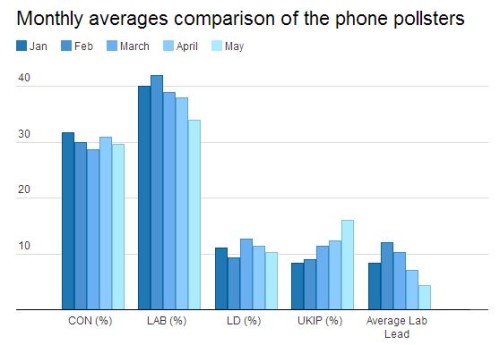For so long it was taken as gospel in Westminster that the better UKIP performed, the worse for the Tories and the better for Labour. Yet the (phone) polling since January suggests otherwise. Whilst Labour’s position in online polls – I’m thinking of YouGov in particular – has been strong, consistent and positive, in phone polls there has been a significant decline in the party’s position since the turn of the year – see this chart from Political Betting:
And the recipient? It looks like it’s UKIP.
We appear, as we head into the final two years of the parliament, to have crossed the tipping point beyond which UKIP start taking more of their support from Labour than the Tories. It is a position few – myself included – ever thought we’d be in.
Back in April I wrote a piece for Total Politics, arguing that UKIP are a political problem for Labour rather than an electoral one, and that there had been “barely been a ripple of concern in the Labour Party” at the purple rise. But that was before the local government earthquake earlier this month. But even before then the party had begun to plan for the UKIP surge. As I wrote back in April:
“the lack of a more thorough engagement with the UKIP threat is clearly a source of concern in Labour HQ. In recent weeks (post-Eastleigh, but post-Rotherham and Middlesbrough too) the party has begun a review into UKIP’s appeal, and what the impact might be on Labour’s prospects in 2015.”
That begs the question of course – how is this review progressing? What has it found? Has Labour’s messaging changed to take into account UKIP’s potency? Because if it has, then this wasn’t reflected in the County Council elections. In many parts of the country where Labour might not have expected to win, but hoped to improve vote share, anything we achieved was dwarfed by the UKIP surge.
For what it’s worth, I still don’t think UKIP will either cost Labour a majority or provide us with an easy route back to power – that will either be a result of Tory success or our failure – but it would be wrong to continue viewing UKIP’s poll success as without problems for Labour. Ed Miliband has put stock in his ability to win over non-voters, yet at present they seem to be drawn at least as much by Farage’s no-nonsense, ebullient nationalism as Ed Miliband’s One Nation-ism.
If Labour wants to not only win the election, but also win a decisive victory, then winning a larger percentage of non-voters and other wooed by UKIP will be necessary. As John Denham wrote here a few weeks ago:
“most of the UKIP voters I have met are people I would like my Labour Party to attract and represent.”
Labour need to be mindful of that. But what’s the plan to achieve it? It’s not clear yet that there is one.





More from LabourList
‘We need some light in the darkness’ Labour’s Leadership – a grassroots view
‘Re-election or relegation: why Labour may need a counterattacking strategy’
‘An open letter to my fellow Labour MPs: if not the full Hillsborough Law, what is this government for?’